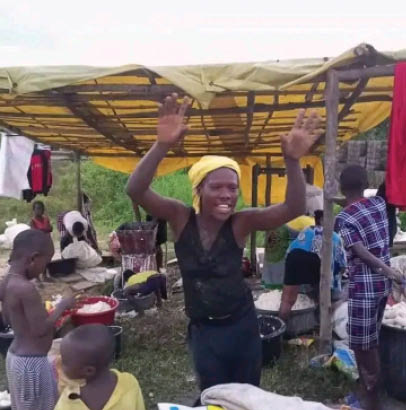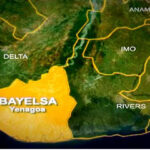The widespread flooding, which has affected people across 33 of Nigeria’s 36 states, has caused huge economic losses to business owners, among others. In most of the states, business owners are counting their losses in millions of naira as the floods have either washed away their means of livelihood or made it impossible to access them.
Shop owners across several communities in Osopong one and Osopong two wards in Obubra Local Government Area of Cross River State have lamented huge losses as a result of the destruction of their shops.
- Many flee as bandits attack community, kidnap 13
- Suspected attackers of Senator Ubah arrested – Soludo
Floods wreaked havoc in most parts of the state in the last month, such that many families resorted to taking refuge in primary schools.
Infrastructures like roads that linked Osopong communities with adjoining communities were also destroyed. The flood also swallowed the sources of drinking water in the community.
One of the shop owners in Obubra, Michael Linus Ofem, whose motor spare parts shop was submerged, said his entire savings had all gone.
The vice chairman of Obubra Local Government Area, Mrs Peace Obeten, who lamented the plight of the people, called on the Cross River State Emergency Management Agency and the National Emergency Agency to assuage the pains and losses of her people.
Goods were destroyed in Edo as flood-ravaged communities on the bank of the River Niger. Provision shops were submerged in various communities across Etsako Central and Etsako East local government areas of the state.
A shop owner in Anegbette, Abubakar Isah, whose provision shop was submerged, said he could not save anything from his shop.
He called on the federal and state governments to come to their aid so as to cushion the effect of the flood.
Bayelsa cut off, PMS sells at N800
Bayelsa is one of the most affected states in the country. For more than two weeks, all the access roads to the state have been cut off as floods take over major roads, cutting off the supply of goods and food items to the state.
Business owners have had their premises flooded and their goods damaged.
The flood also led to an arbitrary increase in the price of petroleum products and goods in the state. A litre of premium motor spirit is being sold at N800, above the approved pump price of N180 as the power supply has been cut off in most parts of the state. This has forced the state government to set up two committees comprising government officials and marketers and traders respectively.
One of the displaced victims, Mrs Juliet Akporuku, who runs a provision shop at Igbogene community in Yenagoa, said her shop and all the items in it had been overtaken by flood.
She said that before the flood she loaded the store with products worth a million naira in preparation for Christmas sales.
“The whole shop has been taken over by flood, while my family and I are now living as refugees,” she said.
A trader at Zarama market, Mr Stephen Nnaemeka, said traders in the market suffered untold hardship as their investments were completely destroyed.
He said, “It is not only my shop, many others were affected, and there is nothing we can do. Nobody caused flooding, it is a natural disaster. My only prayer is that God should show the way after this problem.
“There is nothing to provide for my family’s needs at the moment. Things are rough for me, but I believe in my God.”
Food prices soar in Lagos, Ogun, others
Findings by our correspondent in Lagos, Ogun and other southwestern states revealed that prices of some food items have increased as a result of disruption in the supply chain occasioned by recent floods across the country.
A check at some markets in Lagos revealed that the supply of tomatoes, maize, rice and some grains are affected as the number of trucks coming to the state has been reduced.
Umaru Usman, who offloads trucks at Kara market, along the Lagos-Ibadan expressway, said many trucks could not come to Lagos because of the flood situation.
He said few trucks carrying tomatoes entered Lagos from the northern part of Nigeria, noting that a bag of maize, which used to cost N15,000, now sold at N29,000.
This is just as the government said no fewer than 4,885 households were affected by the recent flooding in Ogun.
The director-general of the National Emergency Management Agency (NEMA), Alhaji Mustapha Ahmed, disclosed this in Abeokuta during the presentation of relief materials by the agency to the state government for distribution to flood victims.
Represented by the Director of Special Duties, NEMA, Dr Bandele Onimode Ahmed, said the assessment conducted recently by the agency revealed the statistics.
“The result of the assessment indicated that 4,885 households were affected by the flood,” he said.
The federal government also delivered some grains to the Lagos State Government, which included 160 MT of maize, 141.4 MT of sorghum and 64.2 MT of garri.
Through the NEMA, the government also delivered relief materials, food and non-food items to support persons affected by the flood disaster, including 1,000 bags of 10kg rice, 1000 bags of 10kg beans, 75 kegs of vegetable oil, 12,000 pieces of nylon mats, 1,000 pieces of treated mosquito nets, 600 cartons of bath soap and 1,000 pieces of men, women and children’s clothing each, amongst others.
10 escape death in Delta
At least 10 persons cheated death in the Udu kingdom as flood-ravaged over 18 communities in the Udu Local Government Area of Delta State.
Communities in Udu affected by the flood include Emadadja, Ekrota, Ubogo, Ukpiovwin, Ukperheren, Obubu, Oghior, Ogbe-Udu, Okolor Waterside, Okolor Inland, Egini and Erhiephihor.
Others were Ayama, Epame, Aladja, Orhuwhorun, Ugbisi, Otor-Udu and many others.
While speaking with journalists shortly after an on-the-spot assessment of the affected communities, the chairman, Udu Local Government Council, Chief Jite Brown said, “Almost 65 per cent of the communities in the locality had been ravaged by the flood.
“Houses, farmlands and properties worth millions of naira were destroyed.
“We are still intensifying efforts to know the extent of the damage because there are areas we can no longer access until the flood recedes.”
Abiodun Alade (Lagos), Eyo Charles (Calabar), Usman A. Bello (Benin), Bassey Willie (Yenagoa), Jude Aguguo Owuamanam (Owerri) & Meluwa Kelvin (Asaba)

 Join Daily Trust WhatsApp Community For Quick Access To News and Happenings Around You.
Join Daily Trust WhatsApp Community For Quick Access To News and Happenings Around You.

